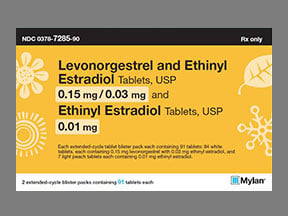Ashlyna is a limited distribution medication.

Ashlyna Coupons & Savings Card – Discount Prices from $26.56
Brand for: Levonorgest-eth estrad 91-day
My prescription
Edit
0.15-0.03 &0.01MG, Levonorgest-eth Estrad 91-day (91 Tablets)
Select pharmacy

CVS
$30.05
COUPON PRICE
Albertsons
$26.56
COUPON PRICE
Walgreens
$31.29
COUPON PRICE
Walmart
$32.62
COUPON PRICEAshlyna savings card
Show this card to your pharmacist
Albertsons
$26.56
BIN
ID
PCN
GRP
019876
LH250EBF44
CHIPPO
LHX
Powered by
Price history for Ashlyna (brand) & Levonorgest-eth Estrad 91-day (generic)
91 Tablets, 0.15-0.03 &0.01MG
Average retail price for Ashlyna
Average retail price for Levonorgest-eth Estrad 91-day
Average SaveHealth price for Levonorgest-eth Estrad 91-day
Our price history data is based on aggregated prescription data collected from participating pharmacies in America. Our prescription data updates daily to reflect the latest price changes. If you notice a missing data point, it means there wasn't sufficient data available to generate a monetary value for that date.
Over the last 12 months, the average discount price of Ashlyna is $36.05 using the SaveHealth savings card. That's an average savings of 82.63% on Ashlyna with our discount card.
*Retail prices are based on pharmacy claims data, and may not be accurate when we don't have enough claims.
Ashlyna (Levonorgest-eth Estrad 91-day) dosage forms
Dosage Quantity Price from Per unit 0.15-0.03 &0.01MG 91 Tablets $26.56 $0.29 0.15-0.03 &0.01MG 182 Tablets $33.80 $0.19
| Dosage | Quantity | Price from | Per unit |
|---|---|---|---|
| 0.15-0.03 &0.01MG | 91 Tablets | $26.56 | $0.29 |
| 0.15-0.03 &0.01MG | 182 Tablets | $33.80 | $0.19 |
What type of pill is Ashlyna?
Ashlyna is a combination oral contraceptive pill. It contains a combination of estrogen and progestin hormones, specifically levonorgestrel and ethinyl estradiol, which are used to prevent pregnancy.
Can Ashlyna cause weight gain?
Weight gain is not commonly reported as a side effect of Ashlyna. However, individual reactions to medications can vary, and some people may experience changes in weight. If there are concerns about weight changes while taking Ashlyna, it is advisable to consult with a healthcare provider.
Does Ashlyna stop periods?
Ashlyna is an extended-cycle oral contraceptive that typically reduces the frequency of menstrual periods to four times a year. While it may not completely stop periods for everyone, it often results in lighter and less frequent bleeding. Some users may experience spotting or breakthrough bleeding, especially during the initial months of use.
Do I ovulate on Ashlyna?
Ashlyna is a combination oral contraceptive pill that typically works by preventing ovulation. When taken as directed, it suppresses the release of an egg from the ovary, thereby preventing ovulation. However, no contraceptive method is 100% effective, so it's important to follow the prescribed regimen closely.
What are the side effects of Ashlyna BC?
Ashlyna, a combination oral contraceptive, may cause side effects such as nausea, headache, breast tenderness, weight changes, mood changes, and spotting or breakthrough bleeding. Some individuals may also experience more serious side effects, including blood clots, high blood pressure, or liver problems. It is important to consult a healthcare provider for a comprehensive list of side effects and to discuss any concerns.
